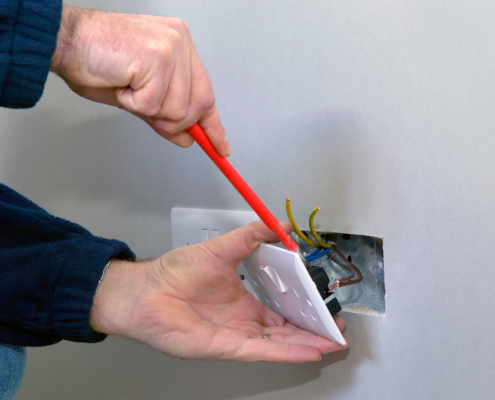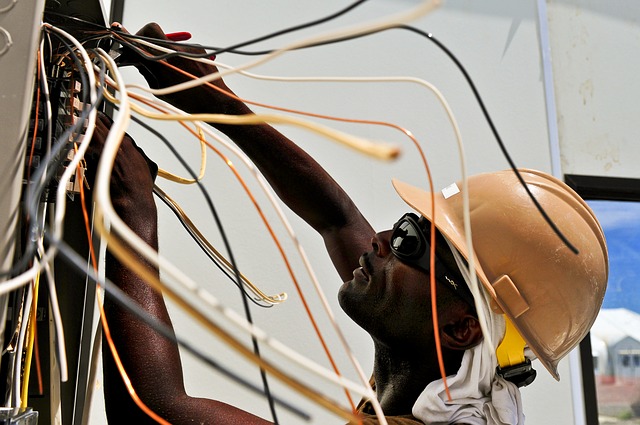Tailored BRE Electrical Solutions for Homes and Businesses
Tailored BRE Electrical Solutions for Homes and Businesses
Blog Article
Checking Out the Globe of Electric Installation: Common Errors to Avoid for a Smooth DIY Project
From ensuring safety measures are met to conforming with electrical codes, the journey into the world of electric work needs focus to information and accuracy. By being conscious of these mistakes and how to prevent them, you can browse the intricate landscape of electrical installation with confidence and ensure a smooth project implementation.
Inadequate Safety Precautions
In electrical installment projects, overlooking appropriate safety preventative measures can bring about hazardous circumstances that threaten both individuals and property. One usual blunder is stopping working to turn off the power supply before starting any type of work. This oversight can cause electrical shocks or perhaps fires. Another important mistake is ignoring to use personal protective tools (PPE) such as insulated handwear covers, security goggles, and non-conductive shoes. These items are vital in guarding versus potential mishaps. Furthermore, inadequate grounding or bonding can posture serious dangers. Poorly based electric systems can lead to electrical rises and equipment damages. Ignoring local building codes and laws can have serious repercussions. These guidelines are implemented to make certain the security of the installation and the residents of the structure. By adhering to security protocols, consisting of appropriate training, making use of safety equipment, and adhering to policies, people can reduce dangers and advertise a safe and secure electrical setup environment.
Incorrect Cord Sizing

Wrong wire sizing can also affect the total efficiency of the electric system. Small cables can cause voltage decreases, resulting in poor efficiency of electrical gadgets and home appliances. Large cords, while not as destructive as undersized ones, can still lead to unnecessary expenditures and inefficient use resources.
To stay clear of these issues, it is necessary to follow appropriate cable sizing guidelines based upon the electric tons needs of the installation. Consulting with an expert electrician or referencing the National Electrical Code (NEC) can aid make certain that the cables are sized appropriately for a secure and reliable electrical installation.
Overlooking Grounding Needs
One vital aspect typically ignored in electrical installments is making certain conformity with appropriate grounding demands. Grounding is a fundamental safety attribute that safeguards against electrical shocks and stops devices damage. Ignoring grounding needs can result in serious consequences, including the danger of electric shock, fire threats, and tools malfunction. To guarantee correct grounding, it is vital to adhere to the National Electrical Code (NEC) guidelines and local regulations.
Basing functions as a pathway for electric currents to flow securely right into the planet, avoiding the accumulation of excess voltage that can harm people or tools. It additionally assists to stabilize voltage levels and enhance the general performance of the electrical system. Proper grounding includes connecting electrical devices and metal rooms to the ground cord, grounding pole, or basing plate. It is critical to use the proper scale of wire for basing objectives and to guarantee all links are safe and secure and without deterioration.

Overlooking Neighborhood Building Regulations
Disregarding adherence to neighborhood building codes can position considerable risks in electric installments, possibly compromising precaution and system dependability. Neighborhood building codes are established to guarantee that electrical work meets certain security standards and regulations established by the authorities. Disregarding these codes can bring about serious repercussions, such as electric fires, electrical shocks, or damage to the home.
Local building regulations usually cover different aspects of explanation electric installations, including wiring techniques, outlet placements, circuit security, and grounding demands. Failing to abide by these codes might result in fines, fell short inspections, or the demand to redesign the whole electrical work, bring about unneeded expenses and delays.
To avoid the risks of disregarding local building regulations, it is essential for do it yourself enthusiasts and also specialists to acquaint themselves with the appropriate policies prior to starting any kind of electrical task. Consulting with neighborhood authorities or hiring an accredited electrical contractor for support can assist guarantee that the electrical setup satisfies all the needed code requirements, advertising a safe and dependable electric system over time.

Poor Planning and Organization
Have you thought about exactly how thorough planning and company are essential elements in making certain the success and safety of an electric installment project? Poor preparation and company can cause a myriad of concerns, varying from job hold-ups to serious safety and security dangers. One usual mistake is undervaluing the scope of job entailed in an electrical installment, which can lead to insufficient materials or insufficient preparation. Without a detailed plan laying out the actions, timeline, and required sources, DIY lovers may locate themselves bewildered and susceptible to errors.
Moreover, lack of organization can lead to confusion pertaining to the design of electrical elements, potentially causing damaged links or circuits. Failing to identify cables properly or track circuit representations can lead to fixing nightmares down the line. In addition, bad planning in terms of budgeting and procurement can lead to unnecessary expenditures or hold-ups in completing the job.
To stay clear of these risks, make the effort to create a thorough plan, collect all needed products and devices ahead of time, and make certain that you have a clear understanding of the job range prior to beginning - BRE Electrical. Proper organization and preparation are crucial to a successful electrical installment task
Conclusion
Finally, it is crucial to focus on safety and security, appropriate preparation, and adherence to neighborhood codes when carrying out electrical installment jobs. Staying clear of typical mistakes such as insufficient safety and security precautions, wrong wire sizing, overlooking grounding needs, content and inadequate preparation can make see page sure a smooth DIY job. By complying with these standards, people can effectively browse the world of electric installation with confidence and efficiency.
Report this page